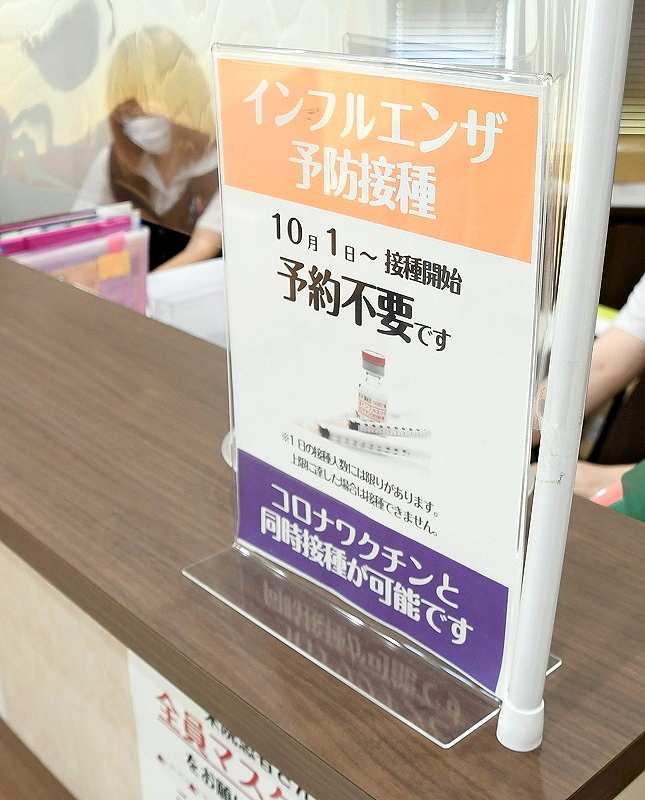Japan prepares for flu-COVID double whammy

A poster displayed at Makuhari Clinic in Chiba says,“You can get vaccinated against both COVID-19 and the flu at the same time.”
1:00 JST, October 2, 2022
Japan could be hit by a disease double whammy this winter, with the simultaneous spread of flu and COVID-19.
In the two previous winters, there were no outbreaks of seasonal flu due to thorough infection prevention measures amid the novel coronavirus pandemic. However, behavioral restrictions have since been eased and there are growing concerns that the two malaises could burgeon concurrently.
Full-scale flu vaccinations kick into gear this month. But experts say that since it is now possible to be vaccinated against flu and COVID-19 vaccine on the same occasion, elderly people and others at high risk of developing severe symptoms should get both vaccines at an early date.
“I’d like you to assume that there’ll be a simultaneous outbreak of seasonal flu and COVID-19 and discuss what the health and medical service systems can do about it, including outpatient treatment,” Health, Labor and Welfare Minister Katsunobu Kato said Sept. 21 during a meeting of an advisory panel tasked with analyzing the impact of COVID-19.
If the two diseases spread in parallel, it could strain fever outpatient clinics and other medical services, which potentially could lead to people not receiving appropriate treatment and developing severe symptoms.
Seasonal flu outbreaks usually occur between December and March. The National Institute of Infectious Diseases estimates that around 10 million people become infected with influenza during an average year. However, during the 2020-21winter season only 14,000 were hit by the disease, with the figure falling to just 3,000 in the 2021-22 winter season. It is highly likely that these dramatic declines were down to infection prevention measures.
In light of these numbers, why are there concerns about a flu outbreak this year? Norio Sugaya, a visiting professor at Keio University and an expert in influenza, cited two reasons from among others: More people — primarily children — now lack sufficient immunity against flu because there was no flu outbreak for two consecutive years, and in-person contact has increased due to the government’s easing of behavioral restrictions and border-control measures.
In Australia, which is used as a yardstick to estimate the likely number of flu infections in Japan, about 220,000 cases of flu were reported this year in the period until mid-September — a sharp rise from the 598 cases logged last year. In Japan, meanwhile, there have been confirmed cases of flu since around July, including a group infection of 14 people in Nagano in September.
“In Australia, the flu and COVID-19 spread together; the same could happen in Japan,” Sugaya said.
Record-high order
To prepare for a possible simultaneous outbreak, the health ministry has asked companies to up flu vaccine production. This winter, it is expected that a record number of about 70 million doses will be supplied.
In principle, people must wait at least 13 days to receive a different vaccine after receiving a COVID-19 shot, but the ministry allows people to receive COVID-19 and flu vaccines on the same occasion, based on overseas reports that the procedure is safe and effective.
There is no order for the vaccines, nor are there any rules about leaving an interval between administering the two shots. One clinic says it plans to inject one each of the two vaccines into a different arm.
Concerns over shortages
Ahead of the flu vaccination season, Makuhari Clinic in Chiba put up flyers in a waiting room that read, “You can get vaccinated against both COVID-19 and the flu at the same time.”
The clinic’s director, Junichi Miyamoto, said: “If the two diseases spread simultaneously, it’ll put pressure on the outpatient department. To prevent this from happening, I want as many people as possible to get the vaccines.”
Though simultaneous vaccination has been approved for the first time this winter, they jabs are likely to be administered mainly at individual medical institutions such as clinics, as the procedure would likely be difficult to carry out at group vaccination venues.
However, as there is no precedent for this kind of double vaccination, some have raised questions about how many people can be dealt with within a given time frame. A number of officials have even expressed concerns about a possible shortage of vaccines, despite the government’s plan to procure record amounts.
Some municipalities — including the Tokyo metropolitan government and the Osaka prefectural government — plan to make flu vaccines free for people age 65 and older. “Making the vaccines free and allowing simultaneous vaccination could stimulate demand,” a member of the health ministry’s expert panel said.
Last winter, 90 percent of about 57 million doses were administered, but some people were still left wanting.
Tadashi Ishida, chairman of the Influenza Committee of the Japanese Association for Infectious Diseases and deputy director of Kurashiki Central Hospital, said: “We have to avoid a situation wherein elderly people, infants under 5 and other high-risk individuals can’t get vaccinated. We hope the central government will make adjustments so everyone who wants the shots can get them. ”
JN ACCESS RANKING





